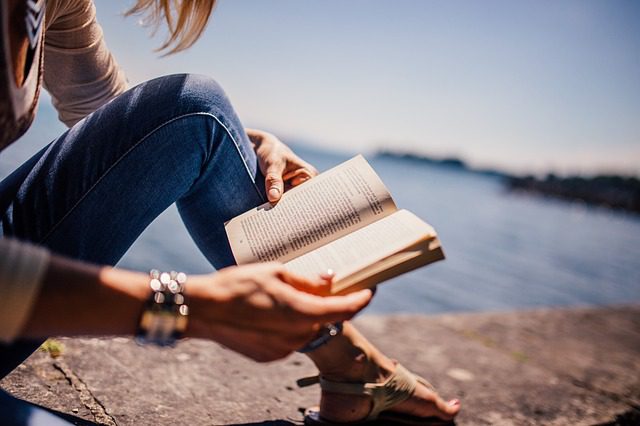It was an awakening. That moment when I sat down to think through what 10 books I would share in the 10-book challenge (because I take these social media games seriously). Trying to nail down the most formative books of my life wasn’t exactly easy, but a few immediately floated to the top of my awareness. And then a few more that didn’t quite make the list, but that I acknowledged as formative. John Irving. Stephen King. Silas House. Dickens. Fitzgerald …
It came clear pretty quick that my list was mostly white dudes.
Oh, wait, Lucy Maud Montomerey! The Brontes! J.K. Rowling!
Women, yes. But still white. This is a problem.
Over the next week or two, as I shared my titles on Facebook, I was tempted to throw in a few authors of color, just to make myself look woke. But the challenge was to share books that were favorite/most formative. If I’m being honest with myself, and if I’m taking a critical look at my formal education, the authors who shaped my worldview — and the ones that can still send me running to the book store for a new release — are white. Mostly male and white.
I literally just wrote a book about why this is a problem. But I hadn’t noticed the problem quite so literally in my own reading of the world.
This may not seem like a crisis, on the surface. None of the books on my list have overtly racist themes. If anything, I love these authors because of the ways they have been progressive voices for their time. But if those voices are predominantly white, and male, then my perspectives have been largely skewed towards a white male worldview. Even as an #Englishmajor at fairly liberal university, the curriculum contains the books that have most profoundly shaped western civilization as we know it. And that world, as we know it, has been built by white men. One way or another, we perpetuate that cycle by what we acknowledge as “classic,” “canon” and “definitive.”

This is how patriarchy takes root and shapes every system we’re a part of. The white and masculine worldview continues to define us, because we continue to elevate those voices. In an effort to break that cycle, my summer reading list contains only books by people of color. Primarily female. These are books I’ve read in the past, books I’m reading at the moment, or titles I have in my “to-do” pile. I know I’ve been preaching at you nerds for years that summer is for fiction, but I’m making an exception this time. In our current context and climate, it’s important that we diversify our literary landscape.
- We Were Eight Years in Power: An American Tragedy, by Ta-Nehisi Coates. This book will absolutely knock your socks off. If we started assigning it to every high school student in the country, right now, we *might* just live in a post-racial society within a generation. When you’re done with this one, go back and also read Between the World and Me. And everything Coates has written for The Atlantic, ever.
- Ain’t I a Woman. Earth-shattering, in the best possible way. bell hooks brings a uniquely Kentucky perspective to issues of racism and misogyny. I referenced her work frequently in my book because you literally can’t talk about patriarchy in American society without following the trail of her research and storytelling.
- Whiskey and Ribbons. (Fiction, yay!) I first discovered Leesa Cross-Smith when I came across this incredible piece she wrote for the Oxford American, about country artist Sturgill Simpson. It was just some truly excellent writing. When I saw that she was also a Kentuckian, I wanted to track down everything she’d ever written. I found that she had a new novel coming out and pre-ordered immediately. By the time it came to my door a few months later, I’d forgotten all about it. But I set aside everything else I was reading at the time and plowed through this one in about three days. Just gorgeous prose. It almost reads like poetry or music in places. The storyline itself moves kind of slow at times (and, fair warning, is sad). But you won’t even care because the writing is so good. It is also really sensual, in all the best possible ways. White people tend not to write like that.
- Mudbound, by Dee Rees. Also fiction. A truly a compelling, complex story and one of those that you can’t put down. It has a strong sense of place and well-developed characters, my two favorite things in a novel. It will break your heart, but strikes a hopeful chord at the end. Also an award-winning movie (on Netflix!).
- Barracoon: The Story of the Last Black Cargo, by Zora Neale Hurston. Sort of. In 1927, Hurston documented the story of Cudjo Lewis, who was enslaved for 50 years AFTER the slave trade was outlawed in the U.S. This material was only recently compiled and edited, and I found it on the new release table at Costco (where, you’d better believe, I piled a stack of Zora N. Hurstons on top of the Donald Trump nonsense. Small acts of resistance, etc.). Side note, Their Eyes Were Watching God, by the same author, actually IS in the typical English Major Lexicon, and should also be on your summer reading list if you haven’t read it before. Maybe even if you have.
- Americanah, by Chimamanda Ngozi Adichie. I haven’t read this one yet, but if her short epistle We Should All Be Feminists — also frequently referenced in my book — is any indication, I want to read everything she’s written ever.
- Things Fall Apart, by Chinua Achebe. A broadly acknowledged classic that I only vaguely remember from college and am going to re-read now.
- The Color Purple, by Alice Walker. I did read this in high school, but not for assignment. I don’t remember reading any black authors for high school homework. None. But I never noticed, which is convicting.
- The New Jim Crow, by Michelle Alexander. An unsettling commentary on racism and mass incarceration.
- Just Mercy, by Bryan Stevenson. The story of the exceptional young attorney who came to create the Equal Justice Initiative: a legal practice that advocates for the poor, defends the wrongly condemned, and tries to mine the complex injustices of our criminal justice system.
If you want more, Goodreads has this excellent list of Books White People Need to Read. Bottom line, we’ve all got work to do.
Don’t get me wrong, I’ll still read the new Stephen King. (Unless it’s terrible? Please tell me if it’s terrible, as some of his more recent ones have been …) But if we want to change the world we live in and see a more inclusive society evolve in our time, we have to start with our own bookshelves. We are what we read.












